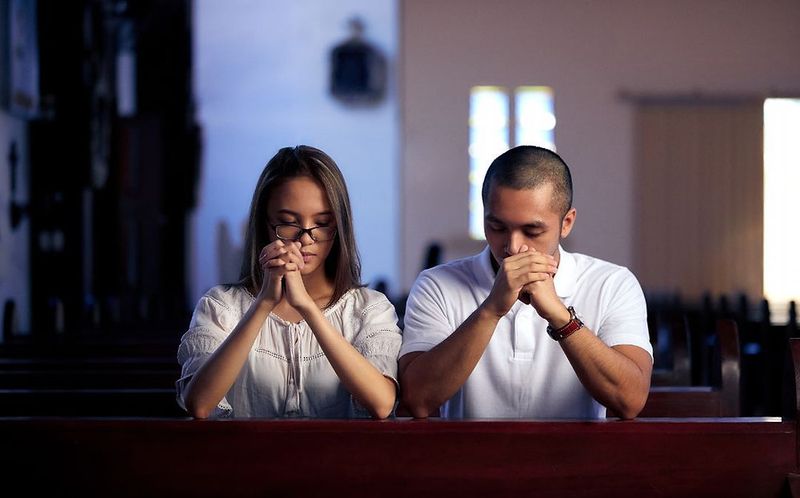27 Common Reasons Couples Stay Married Even When They’re Unhappy

Many couples choose to remain in marriages that no longer fulfill them, but the reasons for doing so are varied and complex.
Understanding these reasons can provide insight into the decisions couples make and the dynamics that keep them together, even when happiness seems elusive.
This blog post explores 27 common reasons why couples may decide to stay married despite feeling unhappy, highlighting the emotional, practical, and social factors at play.
1. Financial Stability

Financial stability is a significant factor that influences couples to remain in marriages, even when they are unhappy. The economic interdependence that marriage often brings can create a situation where separating would lead to financial hardship for one or both partners. Many couples find that their combined incomes provide a level of comfort and security that would be difficult to maintain individually.
This financial security extends beyond daily expenses to long-term goals such as retirement savings, investments, and property ownership. The prospect of dividing assets and bearing the costs of two separate households can be daunting.
Additionally, one partner may be financially dependent on the other, making it practically impossible to leave without facing severe financial strain. The fear of a diminished lifestyle or inability to support oneself can lead to a decision to stay.
Emotional ties to shared assets, such as a family home, can also play a role. The desire to maintain a certain standard of living and avoid financial insecurity often outweighs the unhappiness felt within the marriage, leading many to stay together for financial reasons alone. Economic stability thus becomes a compelling reason to remain married, even in the absence of emotional fulfillment.
2. Children’s Well-being

Children’s well-being is a powerful motivator for couples to stay married, even when they are unhappy. Parents often prioritize the stability and continuity that a two-parent household can offer, perceiving it as essential for their children’s emotional and psychological development.
The decision to remain together is frequently rooted in the belief that separation might negatively affect the children, leading to feelings of guilt or failure as a parent. Many couples fear the potential impact of divorce, such as disruptions in the child’s routine, schooling, and social life.
The desire to provide a united front and consistent parenting approach can also keep couples together. Moreover, the daily logistics of parenting, including school runs, extracurricular activities, and family commitments, may seem more manageable within a single household.
Couples often weigh the potential trauma of divorce against the current unhappiness, choosing to endure personal dissatisfaction for the sake of their children. The hope is that preserving the family unit will provide a nurturing environment that fosters growth and security for the children, even if the marriage itself lacks fulfillment. Thus, children’s well-being becomes a central reason many couples remain married despite unhappiness.
3. Social Expectations

Social expectations play a crucial role in why many couples stay married even when they are unhappy. Societal norms and cultural pressures often dictate that marriage is a lifelong commitment, and breaking that commitment can lead to judgment or ostracism from community and family. The fear of being perceived as a failure or the stigma attached to divorce can be significant deterrents.
Couples may feel pressure to maintain an image of a successful and happy marriage, especially in communities where marriage is highly valued and divorce is frowned upon. Additionally, friends and family may unintentionally reinforce these expectations by encouraging couples to work through their problems rather than separate.
This external pressure can lead to feelings of shame or inadequacy at the thought of ending the marriage. The desire to conform to social norms and avoid negative judgments often outweighs personal dissatisfaction. Couples may also stay together because they value the social status that comes with being married or fear the social isolation that might accompany divorce.
Consequently, the weight of social expectations can keep couples in unhappy marriages, as they strive to meet the perceived standards of their community and culture.
4. Emotional Attachment

Emotional attachment is a significant reason many couples stay married despite being unhappy. Over time, couples build deep emotional bonds that are not easily severed. These attachments are forged through shared experiences, memories, and the intertwining of lives. Even when the relationship is strained, the emotional connection can remain strong, making the thought of separation painful.
The history shared between partners, including both joyful and challenging moments, creates a sense of familiarity and comfort that can be difficult to relinquish. Emotional dependency might also play a role, where one or both partners rely on the other for emotional support and validation, despite underlying unhappiness.
This attachment can create a sense of obligation or loyalty, where individuals feel compelled to stay out of respect for the bond they have developed. The fear of loneliness or the unknown aspects of life without the other partner can further reinforce this attachment. Thus, emotional ties, even amidst unhappiness, can hold couples together, as they navigate the complexities of their relationship while valuing the emotional depth and history they share.
5. Fear of Loneliness

Fear of loneliness is a compelling reason why many couples remain married, even when unhappy. The prospect of being alone can be daunting, particularly for those who have spent many years in a partnership. The comfort and security of having a companion, even if the relationship is not fulfilling, can outweigh the desire for change.
This fear is often rooted in the anxiety about starting over or the uncertainty of finding someone new. The emotional and social aspects of loneliness can be particularly challenging, as individuals may worry about losing shared social circles or experiencing social isolation. Additionally, the routines and habits formed over years of marriage create a sense of stability and predictability that can be difficult to abandon.
The fear of loneliness can also be exacerbated by societal stigmas associated with being single, particularly in middle or later life. For many, the idea of facing life’s challenges alone is intimidating, leading to a decision to stay in an unhappy marriage. Thus, the fear of loneliness becomes a powerful motivator, keeping couples together even when their relationship lacks joy and fulfillment.
6. Religious Beliefs

Religious beliefs can significantly influence a couple’s decision to remain married, even in the face of unhappiness. Many religions view marriage as a sacred, lifelong commitment that should be preserved regardless of personal dissatisfaction. The teachings and doctrines of various faiths often emphasize the sanctity of marriage, discouraging divorce and encouraging couples to resolve their differences.
For believers, the decision to stay might be driven by the desire to fulfill their religious obligations and adhere to their spiritual principles. The community support provided by religious groups can also reinforce the importance of maintaining the marriage.
Additionally, the fear of spiritual consequences or divine disfavor can deter individuals from seeking divorce. Religious beliefs may also instill a sense of hope and faith that the marriage can improve, encouraging couples to persevere through challenging times.
The desire to raise children within a specific religious framework or community can further motivate couples to stay together. Consequently, religious beliefs can provide a strong foundation for enduring an unhappy marriage, as individuals seek to align their marital decisions with their spiritual values and commitments.
7. Cultural Traditions

Cultural traditions can strongly influence couples to remain in marriages, even when they are unhappy. In many cultures, marriage is seen as a lifelong union, with deep-rooted traditions and expectations regarding marital roles and responsibilities. These cultural norms can create pressure to maintain the marriage, regardless of personal contentment.
The fear of dishonoring family traditions or bringing shame to one’s family can be significant motivators to stay. Cultural heritage may also emphasize the importance of family unity and collective identity, which can outweigh individual unhappiness. Additionally, marriage can be viewed as an alliance between families, rather than just individuals, adding layers of complexity to the decision to separate.
Couples may also face pressure from extended family members who hold traditional views on marriage and divorce. This cultural backdrop can make the prospect of leaving the marriage daunting, as individuals grapple with the potential loss of cultural identity or community standing. Consequently, cultural traditions and the desire to honor them can be compelling reasons for couples to endure unhappy marriages, as they navigate the expectations and values inherent in their cultural backgrounds.
8. Hope for Change

Hope for change often leads couples to stay married despite unhappiness. Many individuals hold onto the belief that their relationship can improve with time, effort, or external help. This hope can be fueled by past experiences where positive changes have occurred, reinforcing the idea that the marriage is worth salvaging. Couples may invest in counseling or therapy, seeking professional guidance to address underlying issues and rebuild their connection.
The belief that challenges are temporary and can be overcome with patience and commitment often provides a sense of optimism. Additionally, witnessing changes in similar relationships within their social circles can inspire hope for their own marriage. This hope is not solely about the relationship dynamics but may also encompass personal growth and maturity that could lead to a better partnership.
The desire to avoid regret over potentially ending a relationship that could have improved can also be a factor. Consequently, the promise of change and improvement becomes a powerful motivator for couples to remain together, as they work towards a more fulfilling and harmonious relationship, despite current dissatisfaction.
9. Shared History

Shared history is a compelling reason many couples stay married, even when they are unhappy. The accumulation of shared experiences, memories, and milestones creates a bond that can be difficult to sever. Couples often reflect on the journey they have undertaken together, including both joyful moments and challenges overcome. This shared past can provide a sense of continuity and identity that is comforting, even amidst current unhappiness.
The investment of time, energy, and emotions into the relationship fosters a sense of loyalty and commitment to preserving what has been built over the years. Additionally, the thought of starting anew without this shared history can be daunting, particularly for those who cherish the familiarity and understanding that has developed over time.
The intertwining of lives, including friends, family, and traditions, can further strengthen this bond. For many, the idea of losing this rich tapestry of shared experiences is more distressing than enduring the current dissatisfaction. Thus, the shared history acts as a glue that holds couples together, as they navigate the complexities of their relationship while valuing the depth of their past.
10. Lack of Alternatives

Lack of alternatives can compel couples to stay married even when they are unhappy. For some, the fear of the unknown and uncertainty about what life would look like post-divorce can be paralyzing. The prospect of re-entering the dating scene, especially after many years of marriage, can be intimidating and overwhelming. In some cases, individuals stay because they don’t perceive any better options for their future.
The belief that they are unlikely to find another partner or that their life circumstances won’t improve can lead to a decision to remain in the marriage. Additionally, a lack of support from friends or family can make the prospect of leaving feel even more isolating. Economic factors, such as limited job opportunities or financial resources, may also contribute to the perception of limited alternatives.
The fear of making a wrong decision and ending up in a worse situation can further discourage action. Consequently, the lack of perceived alternatives becomes a significant factor in the decision to stay, as individuals weigh the potential risks and benefits of pursuing a different path while grappling with uncertainty and fear of change.
11. Fear of Starting Over

Fear of starting over is a significant reason many couples stay married, even when they are unhappy. The thought of rebuilding a life from scratch, after years or even decades of shared experiences and routines, can be overwhelming. This fear encompasses various aspects of life, including finding a new place to live, forming new social connections, and potentially establishing a new career or financial path.
The emotional toll of unraveling a shared life can be daunting, as individuals face the prospect of losing the comfort and familiarity of their current situation. The practicalities involved in starting over, such as dealing with legal proceedings, financial settlements, and potential custody arrangements, can add to the anxiety. The fear of the unknown, coupled with the effort required to recreate a sense of stability and security, often outweighs the desire for change.
Many individuals also worry about the impact on their identity and sense of self-worth, as they navigate life outside the established framework of their marriage. Consequently, the fear of starting over becomes a compelling reason to remain in an unhappy marriage, as individuals grapple with the uncertainties and challenges of forging a new path.
12. Inertia and Comfort

Inertia and comfort are significant factors that lead many couples to stay married even when they are unhappy. Over time, relationships can settle into routines and patterns that provide a sense of stability and predictability. This inertia makes the idea of change seem daunting, as individuals become accustomed to their current lifestyle, even if it lacks fulfillment.
The comfort of familiar surroundings, routines, and roles can create a reluctance to disrupt the status quo. The effort required to initiate change, coupled with the fear of potential upheaval, can lead to a decision to stay in the marriage. Additionally, the comfort derived from shared responsibilities, such as managing a household or raising children, can outweigh personal dissatisfaction.
The prospect of navigating life without these established routines and support systems can be intimidating. For many, the comfort of staying within a known and predictable environment is preferable to the uncertainty of change. Consequently, inertia and comfort become powerful motivators for remaining in an unhappy marriage, as individuals prioritize stability over the challenges and uncertainties of pursuing a different path.
13. Shared Responsibilities

Shared responsibilities are a key reason many couples remain married despite being unhappy. Marriage often involves a division of labor and mutual support that can be challenging to replicate outside the relationship. Couples frequently share responsibilities such as parenting, managing household tasks, and financial obligations. This interdependence creates a sense of duty and cooperation that can make separation seem impractical.
The logistics of coordinating schedules, managing childcare, and handling finances can be overwhelming without a partner. Additionally, the thought of renegotiating these responsibilities in the event of a divorce can be daunting. The fear of disrupting children’s lives, affecting their routines, and managing joint financial commitments further complicates the decision to separate.
Shared responsibilities also foster a sense of teamwork and partnership, which, despite underlying unhappiness, can provide a sense of accomplishment and purpose. For many, the practical benefits of maintaining shared responsibilities outweigh the desire for personal fulfillment. Consequently, the complexity and practicality of shared responsibilities become significant factors in the decision to stay, as couples navigate the challenges and rewards of their interdependent roles.
14. Fear of Judgement

Fear of judgment is a powerful motivator for couples to stay married, even when they are unhappy. The social stigma associated with divorce can be overwhelming, as individuals worry about how they will be perceived by friends, family, and the wider community. The fear of being judged for not having a successful marriage or for failing to uphold societal expectations can lead to feelings of shame and inadequacy.
Many couples worry about the impact of divorce on their social standing and the potential loss of friendships or support networks. The desire to avoid being the subject of gossip or criticism can be a significant deterrent to pursuing a separation. Additionally, individuals may fear disappointing loved ones who hold traditional views on marriage and divorce.
This fear is often compounded by concerns about the impact on children and the perception that divorce equates to personal failure. The pressure to conform to societal norms and avoid negative judgments often outweighs personal unhappiness. Consequently, the fear of judgment becomes a compelling reason for many couples to remain in an unhappy marriage, as they navigate the complexities of societal expectations and personal fulfillment.
15. Uncertainty of Outcomes

Uncertainty of outcomes is a significant reason why many couples stay married, even when they are unhappy. The unpredictability of what life will look like after separation can be intimidating and discouraging. Individuals often grapple with doubts about their future happiness, financial stability, and the impact on their children.
The fear of making a decision that could lead to unforeseen negative consequences can be paralyzing. The lack of guaranteed positive outcomes can deter individuals from pursuing a divorce, leading them to choose the familiarity of their current situation over the unknown. The prospect of losing joint assets, affecting children’s routines, and dealing with legal complexities can contribute to this uncertainty.
Additionally, individuals may worry about their ability to cope with the emotional and practical challenges of forming a new life. The potential for regret or the fear of making a wrong decision often weighs heavily on the minds of those contemplating separation. Consequently, the uncertainty of outcomes becomes a powerful motivator to stay, as individuals prioritize the known, albeit unhappy, circumstances over the unpredictable nature of change.
16. Fear of Hurting Partner

Fear of hurting a partner is a prevalent reason many couples choose to stay married, despite being unhappy. The emotional bond formed over years of marriage often creates a sense of empathy and responsibility towards each other’s feelings. The prospect of causing emotional pain or distress to a partner can be distressing, particularly if the relationship has been long-term and deeply intertwined.
Individuals may worry about the impact of separation on their partner’s well-being, fearing they might cause depression, anxiety, or a sense of abandonment. This concern is often compounded by feelings of guilt and obligation to protect their partner from harm.
The desire to avoid being the source of pain can lead to a decision to stay, even if personal fulfillment is lacking. Additionally, the hope that the relationship might improve and the fear of regretting the decision to leave can further influence this choice. Consequently, the fear of hurting a partner becomes a significant factor in the decision to remain together, as individuals strive to balance their own happiness with the potential impact on their partner’s emotional health.
17. Legal Complexities

Legal complexities are a significant deterrent for many couples considering divorce, leading them to stay married even when they are unhappy. The legal process of divorce can be lengthy, complicated, and emotionally taxing. Navigating the legal system, understanding rights and obligations, and dealing with paperwork can be overwhelming.
The prospect of engaging in legal battles over assets, child custody, and alimony can be daunting, both financially and emotionally. For many, the fear of losing assets or facing unfavorable legal outcomes can discourage them from pursuing a divorce. The costs associated with hiring legal representation and court fees can also be a barrier.
Additionally, the public nature of legal proceedings can be a concern for those who value privacy. The potential for prolonged legal disputes can add to the stress and uncertainty of the situation. Consequently, the legal complexities of divorce become a significant factor in the decision to stay married. Many couples choose to endure their current unhappiness rather than face the challenges and potential repercussions of the legal process, prioritizing stability over the uncertainties of legal separation.
18. Family Pressure

Family pressure is a compelling reason many couples stay married, even when they are unhappy. The influence of family members, particularly those who hold traditional views on marriage, can be significant. Couples may face pressure from parents, siblings, or extended family to maintain the marriage, regardless of personal dissatisfaction. The desire to meet family expectations and avoid disappointing loved ones can lead to feelings of obligation and loyalty.
Family members may offer advice or express concerns about the impact of divorce, reinforcing the belief that staying together is the right choice. The fear of alienating family members or causing familial conflict can further influence the decision to stay. Additionally, cultural or religious beliefs held by family members can add layers of complexity to the situation.
For many, the support and approval of family are paramount, and the prospect of losing this support can be daunting. Consequently, family pressure becomes a powerful factor in the decision to remain in an unhappy marriage, as individuals balance their own needs with the expectations and values of their family.
19. Lack of Confidence

Lack of confidence is a significant reason many couples stay married, even when they are unhappy. Personal insecurities and self-doubt can lead individuals to question their ability to thrive independently. The fear of failure, both personally and professionally, can prevent individuals from pursuing a divorce. Doubts about one’s attractiveness, competence, or ability to cope with the challenges of single life can be paralyzing.
This lack of confidence may also stem from a long-standing dependency on the partner for emotional or financial support. The prospect of facing life without this support can be daunting. The fear of judgment from others and the pressure to conform to societal expectations can further erode confidence. Additionally, individuals may worry about the impact of separation on their identity and self-esteem.
The uncertainty about finding happiness or success outside the marriage can lead to a decision to stay, even if personal fulfillment is lacking. Consequently, a lack of confidence becomes a powerful deterrent to pursuing change, as individuals grapple with insecurities and fears that keep them anchored in an unhappy relationship.
20. Health Issues

Health issues are a significant reason why many couples stay married, even when they are unhappy. Chronic illnesses or disabilities can create a dependency dynamic, where one partner relies on the other for care and support. The emotional and physical demands of managing health conditions can strengthen the bond between partners, even when the relationship is otherwise strained.
The fear of losing a caregiver or facing health challenges alone can deter individuals from considering divorce. Additionally, the logistics of separating while managing health issues, such as coordinating medical care and insurance coverage, can be overwhelming. The financial implications of healthcare costs and the potential loss of benefits can also be significant concerns.
For some, the belief that the marriage provides stability and support during difficult times outweighs personal dissatisfaction. The desire to fulfill vows made during healthier times, such as “in sickness and in health,” can further reinforce the decision to stay. Consequently, health issues become a compelling reason for couples to remain together, as they navigate the complexities of health and well-being while balancing their personal needs and relationship dynamics.
21. Fear of Impact on Children

Fear of impact on children is a major reason many couples stay married, even when unhappy. Parents often worry about the emotional and psychological effects of divorce on their children. The prospect of disrupting their children’s lives, routines, and sense of security can be distressing. Many couples believe that maintaining a two-parent household provides stability and consistency that is crucial for their children’s development.
The fear of being perceived as a “broken home” and the potential for children to experience feelings of abandonment or guilt can be significant deterrents. Additionally, the logistics of co-parenting and coordinating schedules post-divorce can seem daunting and overwhelming. Parents may also worry about the impact of divorce on their children’s academic performance and social relationships.
The desire to protect children from experiencing pain or trauma often outweighs personal unhappiness. Consequently, the fear of impacting children becomes a powerful motivator for couples to remain in an unhappy marriage, as they prioritize their children’s well-being over their own emotional fulfillment.
22. Comfort in Routine

Comfort in routine is a key reason many couples remain married, even when they are unhappy. Over time, relationships develop routines and habits that provide a sense of security and predictability. The comfort derived from these routines can be a significant deterrent to pursuing change. The daily rituals, shared responsibilities, and established roles within the marriage create a stable environment that can be difficult to relinquish.
The thought of disrupting these routines and adjusting to a new way of life can be daunting. Additionally, the familiarity of the current situation, even if it lacks fulfillment, can be preferable to the uncertainty of starting anew. The fear of losing the comfort and stability of established routines often outweighs the desire for personal satisfaction.
For many, the predictability and familiarity of daily life within the marriage provide a sense of identity and belonging. Consequently, comfort in routine becomes a powerful reason to remain in an unhappy marriage, as individuals prioritize the stability and security of their established way of life over the potential challenges and uncertainties of change.
23. Vows and Commitments

Vows and commitments are a fundamental reason many couples stay married, even when they are unhappy. The promises made during the wedding ceremony, often involving lifelong commitment and dedication, hold significant weight for many individuals. These vows create a sense of obligation and duty to honor the commitment made, regardless of personal satisfaction.
The belief in the sanctity of marriage and the importance of upholding one’s word can be powerful motivators to endure challenges within the relationship. For many, the vows represent a deep moral and ethical commitment that transcends temporary unhappiness. The desire to remain true to these promises, even in difficult times, can outweigh the desire for personal fulfillment.
Additionally, the fear of regret or the potential impact on one’s sense of integrity can further reinforce the decision to stay. The belief that marriage is a lifelong journey, with both highs and lows, often encourages individuals to persevere through challenges. Consequently, vows and commitments become a guiding principle for many couples, as they navigate the complexities of marriage while striving to honor the promises they made.
24. Fear of Divorce Process

Fear of the divorce process is a significant reason many couples stay married, even when they are unhappy. The legal, financial, and emotional complexities involved in divorce can be overwhelming and discouraging. The prospect of navigating the legal system, dealing with paperwork, and engaging in potential disputes over assets and custody can be daunting.
The fear of acrimonious legal battles or lengthy court proceedings often deters individuals from pursuing divorce. Additionally, the financial implications, such as division of assets and potential loss of income, can be significant concerns. The emotional toll of ending a marriage, including feelings of failure, guilt, and loss, can further complicate the decision.
The fear of facing judgment from society, family, and friends can exacerbate these concerns. For many, the prospect of enduring the divorce process is more distressing than remaining in an unhappy marriage. Consequently, the fear of the divorce process becomes a powerful motivator for couples to stay together, as they prioritize stability and predictability over the challenges and uncertainties associated with pursuing legal separation.
25. Age and Time Invested

Age and time invested are significant reasons why many couples remain married, even when they are unhappy. As couples grow older, the prospect of starting over can seem increasingly daunting. The investment of time, energy, and emotions into the relationship over the years creates a sense of loyalty and commitment to preserving what has been built.
The thought of losing the shared history and experiences accumulated over decades can be distressing. The fear of being alone in later years or the challenge of finding a new partner can also influence the decision to stay. Additionally, the realization that time is finite and the fear of regret over leaving a long-term relationship can weigh heavily on the minds of those considering separation.
The belief that the relationship might improve with time or the hope of recapturing past happiness can also encourage couples to persevere through challenges. Consequently, age and time invested become compelling reasons to remain in an unhappy marriage, as individuals balance the desire for personal fulfillment with the emotional and practical realities of their stage in life.
26. Family Traditions

Family traditions play a significant role in why many couples stay married, even when they are unhappy. The rituals and customs shared within a family can create a strong sense of identity and continuity. These traditions often hold sentimental value and are seen as an integral part of family life. The prospect of disrupting these cherished practices and losing the sense of unity they provide can be daunting.
Many couples value the continuity of family traditions, particularly for the benefit of their children, who may associate them with stability and happiness. The fear of impacting the family dynamic or causing a rift during important family events can lead to a decision to stay together. Additionally, the desire to pass down these traditions to future generations can outweigh personal dissatisfaction.
The importance placed on family traditions often fosters a sense of responsibility and commitment to maintaining the marriage, despite underlying unhappiness. Consequently, family traditions become a powerful motivator for couples to remain together, as they prioritize the preservation of cultural and familial continuity over the pursuit of individual fulfillment.
27. Fear of Regret

Fear of regret is a significant reason many couples stay married, even when they are unhappy. The decision to end a marriage is often fraught with uncertainty, and the prospect of regretting such a significant life choice can be daunting. Individuals may worry about the “what ifs,” fearing that they might end up lonelier or less happy than anticipated. The emotional and practical investment in the marriage over the years can contribute to this fear, as individuals contemplate the potential loss of shared history and experiences.
The fear of realizing too late that the decision to leave was a mistake can outweigh the desire for change. Additionally, the hope that the relationship might improve or the belief that challenges are temporary can reinforce the decision to stay.
The fear of impacting children, losing social connections, or facing financial difficulties can also contribute to this apprehension. Consequently, the fear of regret becomes a powerful motivator for remaining in an unhappy marriage, as individuals prioritize the known and familiar over the uncertainties and potential consequences of pursuing a different path.
